The April mission trip to Nigeria – Part 2
Nigeria’s Benue State is 99% Christian: Virtually every member of the state government in Benue, Nigeria is a Christian. The governor, Samuel Ortom, is a dedicated Christian businessman. Before becoming governor, he set up the Oracle Business Limited Foundation and one of the goals of that foundation is “preaching Christ.”

Honorable Terwase Orbunde, chief of staff to Governor Ortom, William J. Murray and Deputy Governor Benson Abounu.
I originally had a meeting scheduled with Governor Ortom but he was called away to the capital to meet with the President of Nigeria. As a result, I spent a good deal of time with the Deputy Governor, Benson Abounu, who is by trade an engineer. A deputy governor is equivalent to a lieutenant governor in the United States.
Deputy Governor Abounu took time to describe in detail the situation of Christians and the current state of Internally Displaced People (IDP’s). All of the IDP’s are Christians driven from their homes by Muslims from the north of Nigeria or from neighboring African nations. He explained that besides the 175,400 displaced Nigerian Christians, there are Christian refugees from the neighboring nation of Cameroon who have fled Islamic terror.
The United Nations reports that 12,100 Cameroonians have registered as refugees in Benue, but it is estimated that there are at least 34,000 total. Deputy Governor Abounu told me that the cost of caring for the refugees and IDP’s is a strain on the budget of Benue State. The last census was in 2006 and there are only estimates, but the current population of Benue State is probably only 8,000,000 with most of those being poor farmers. The capital, Makurdi, is the largest city and only has a population of 500,000 or less.
Deputy Governor Abounu made arrangements for our team to visit attacked villages and IDP camps. He also made arrangements for a government official to meet us in Agatu. Our goal that same day was to reach a church where 113 Christians were killed during a church service.
Because of our lengthy meeting with Abounu, our team would arrive after dark.
We drove south for many hours from Makurdi and stopped briefly at Agatu town, then headed to the village where the attack occurred. When the paved road stopped we had to change cars to continue at under five miles per hour on a dirt road that was more path than road. We passed several villages with many destroyed homes. About half the population had returned having nowhere else to go.

William J. Murray with survivors of the Agatu church massacre. Note that the roof is missing. The inside of the church was set on fire so there are no pews or chairs.
The homes and small businesses are built from sun dried straw bricks that are not kilned. With the roofs torn off, during the rainy season the mud bricks melt away and the homes begin to vanish. Still, some Christians had returned to what was left of their villages despite the promise by Islamic radicals to drive them out again.
By the time we reached the destroyed church it was well into the night but church members who had returned came to greet us, about 35 or 40 in all. A total of 113 were murdered on that fateful day two years ago during a service. The Muslim Fulani Herdsmen came with guns and machetes — and the Christians were armed only with their Bibles.
The Nigerian government called what happened a “clash” between farmers and herdsmen. How is murder of unarmed people inside a Christian church a “clash?”
Security was an issue because of how late we had arrived. The two off-duty police officers we had hired to accompany our team were clearly concerned as it was too dark to see any developing threats. Although the attack on the church occurred more than two years ago, there have been recent attacks as well. The previous week, two farmers were hacked to death.
Despite the high profile of the attack, I was told that I was the first Westerner to visit the church since the attack. Please keep that in mind when I report on my meeting at the European Union Ambassador’s home two days later.
The man who escorted our team to the church was a local official. The morning of the attack, he had talked to his brother who was a member of the church. The official had plans that morning, but he expected to stop and see his brother in the afternoon. His brother did not answer the phone. When he approached the village, the roads were blocked and gun fire could be heard.
His brother was one of the 113 killed in the attack on the church. Many of those I met at the church had lost relatives and neighbors in the massacre.
Although fund transfers are difficult, I am arranging to pay for a new roof for the church.
[su_button url=”https://diapersforrefugees.org/helping-christian-refugees/#DonateLanding”]Please help this month.[/su_button]

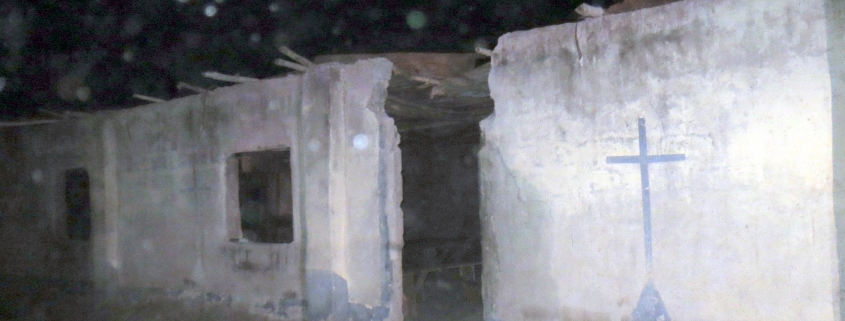
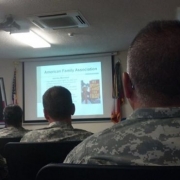
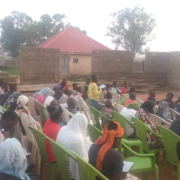
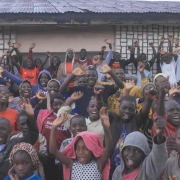
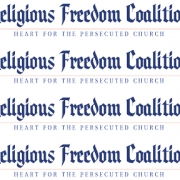
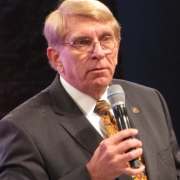


Leave a Reply
Want to join the discussion?Feel free to contribute!